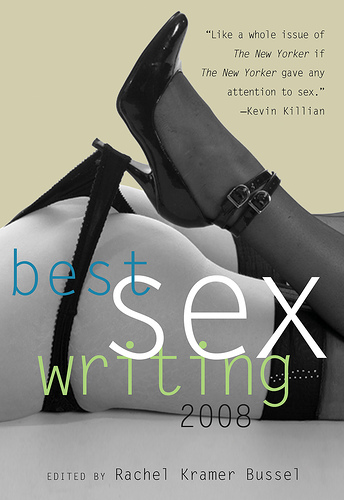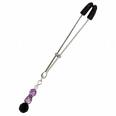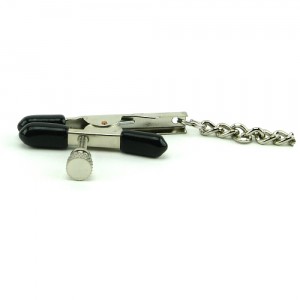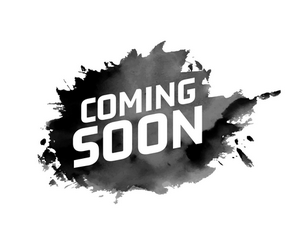“Best Sex Writing 2008” by Cleis Press, is compilation of twenty-one provocative personal essays, sex journalism, and sex blogging that all focus on that one “dirty” word: sex. In her introduction, Rachel writes: “Sex. One little word, so much drama. One little word, so many interpretations, definitions, permutations.” Sex may be the only thing that links these essays, for they are all written from an eclectic range of voices with unique perspectives, exploring a diverse range of topics from sexual culture, sex work, sex toys and health, gender identity, race and crime.
While all of the essays were provocative, revealing information on numerous topics I had not considered, some really grabbed my attention including Ashlea Halpern’s graphic “Battle of the Sexless.” This edgy essay examines-with razor-sharp detail-the agonizing journey through voluntary (sometimes self) castration and eunuch culture. It reveals what motivates men to go to such extreme measures to become genderless and rid themselves of their testosterone-producing overactive libidos. Castration, for reasons other than oncological, is considered “taboo surgery” in the medical community; so many men who want to get “cut” must resort to the “subculture of underground cutters willing to perform guerrilla surgeries in motel rooms, at medical fetish clubs, and just over the Mexican border.” Although this article may make you cringe, it is not written for its shock value alone, but is treated with compassion. A must read.
Another very intriguing article was Trixie Fontaine in “Menstruation: Porn’s Last Taboo.” Oddly enough, I could identify with this piece very much as my study of film and feminist art has centered around the “abject” and the “monstrous feminine” which analyzes the role of women in the horror genre and the fascination with the bleeding female body as seen as the all-devouring vagina or vagina dentata. Fontaine explores the veiled eroticism in menstruation porn, and the obscenity laws and double standards in the porn industry that accepts some body secretions (semen) as acceptable, while others (like menstrual blood) are seen as obscene and offensive.
Kelly Rouba’s “Tough Love,” is a first-person account of sexual ecstasy and disability, as she describes the challenges and frustrations as well as joys and accomplishments she and others who have physical disabilities experience while trying to achieve a fulfilling sex life. This was a great article and a topic that isn’t written about enough. When we think of sex, we often think in terms of able-bodied people. Rouba notes that, “When we broaden our concept of sex, then it’s more inclusive.”
“Surface Tensions” by Jen Cross, stood out because of the personal style and nature of the piece. It is an intimate journal narrative written in stream-of-consciousness style that explores the author’s struggle to cope with her conflicting gender identity and how she is perceived by other queers in the lesbian community based on her “surface” appearance. This essay was emotionally and creatively articulated, and as a reader I could almost feel the tensions and emotional scars that lay buried just beneath the surface like violin strings ready to snap.
Another one of my favorite essays was Greta Christina’s “Buying Obedience: My Visit to a Pro Submissive.” This piece is a spellbinding glimpse into the world of sex work, when a former stripper desires to experience sex work from the other side, as a consumer who pays for a professional submissive. Written in four parts, it explores the liaison from first conceptualization, to her fears and expectations and the encounter itself, then finally her analysis of it afterward. The writing is sexually charged and riveting, and one feels as though they are a fly on the wall in the house of lust-created within the reader’s mind.
Sex bloggers Lux Nightmare and Melissa Gira’s “The Pink Ghetto: A Four Part Series” looks into the complex world of writing for sex and the stigmatization of having to deal with their “fringe identities.” They explain mainstream’s view that only sluts write about sex which leads to them getting “blackballed (pinkballed?) from any kind of ‘legitimate’ work”.
Finally, other interesting reads include “Dangerous Dildos,” Tristan Taormino’s investigation into the phthalate sex toy debate; and “Sex in Iran” by Pari Esfandiari and Richard Buskin that uncovers the sex and drugs culture of Islamic youth whose ideals clash with the fundamentalist authority.
Best Sex Writing 2008 is a must read for those who want to be intellectually stimulated by provocative essays that explore the edges of sexuality, and as Rachel notes at the end of her introduction: “[like] good sex should do: leave[s] you wanting more.” Rachel Kramer Bussel certainly has her finger on the pulse of the world of sex writing.
Get Your Copy of Best Sex Writing 2008 at Amazon.com![]()













